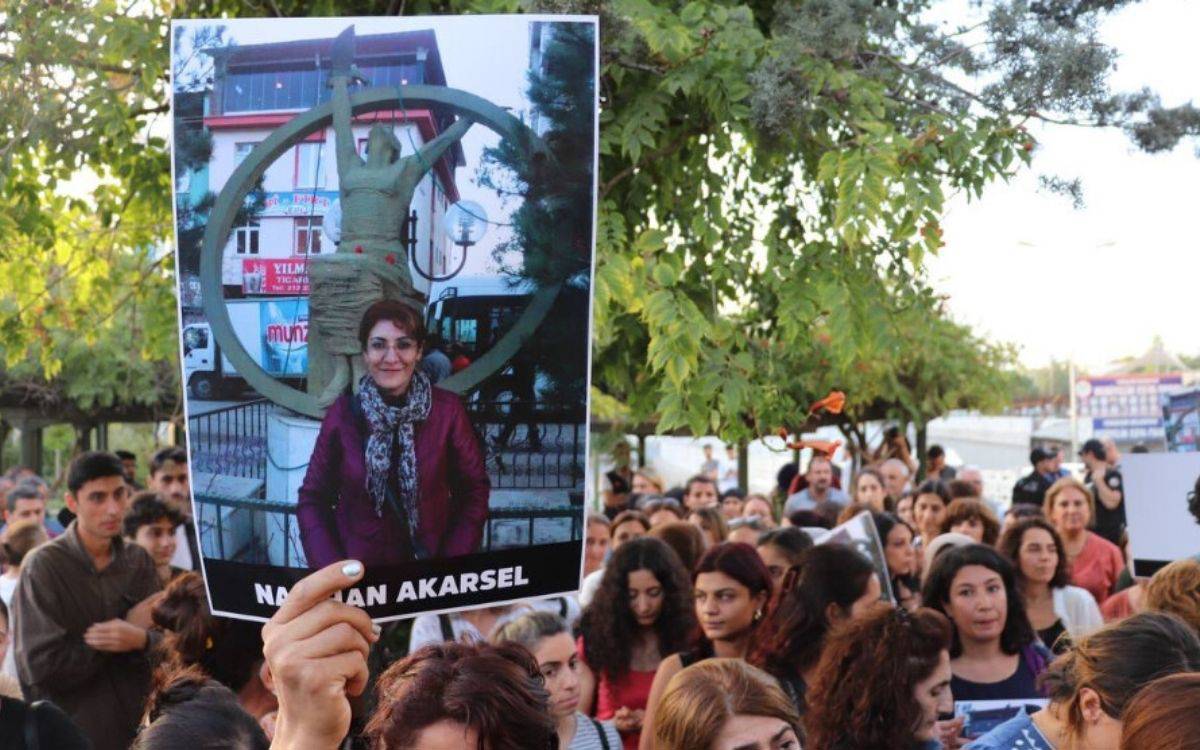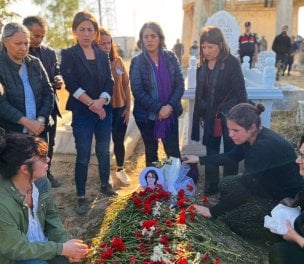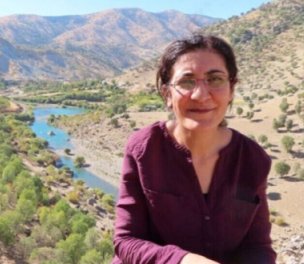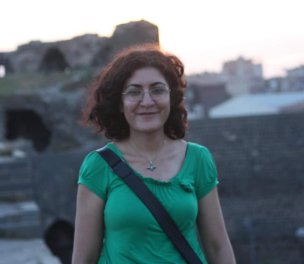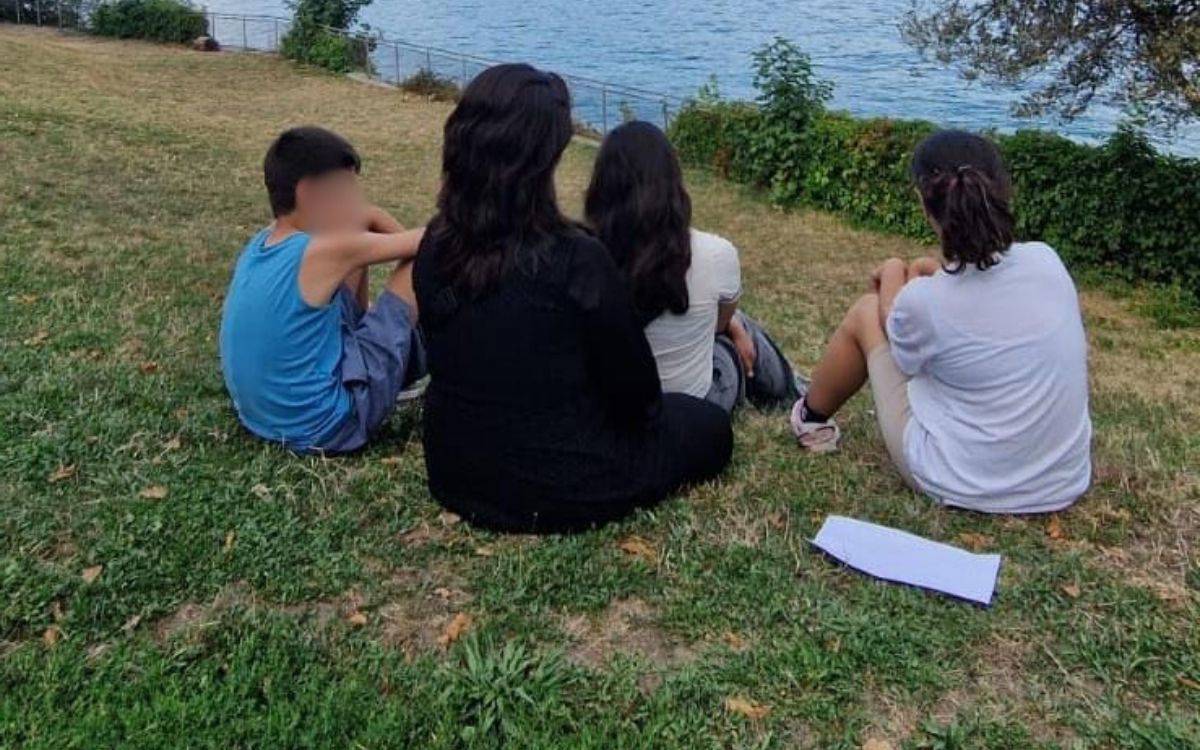"And no one knew that the melancholic pigeon that escaped from the hearts was named belief..." Forugh
She was 45 years old.
She was targeted in an armed attack in front of her house in the city of Sulaymaniyah in the Federal Kurdistan. She died.
She was my friend and colleague. She was a name I looked up to in women's journalism and her perspective on the relationship between women and life.
Her dreams were always centered around women's freedom.
The Kurdish Women's Library, Archive, and Research Center was her project, and the motto of the opening in June was "Writing the history of women through the mouths of women," and "As we write, record, and share our dreams, we carry our memories to the future, in memory of Nagihan Akarsel."
She was no longer with us, but she was present at every moment of the opening.
She grew up among the Kurds settled in Gölyazı, Konya. She was persistent in her studies, completed high school in Konya, and studied communication at Gazi University in Ankara.
She left Turkey in 1997. In 2001, she was arrested and imprisoned in Ankara on charges of "membership in a terrorist organization."
"Leyla Zana and our wards were next to each other in Ulucanlar Prison. Sometimes they would take other women friends to Leyla's ward. Nagihan was also placed in that ward at that time. Although we didn't have much chance to communicate with each other, during the day, we could occasionally chat and participate in educational activities together."
Nagihan met Hatip Dicle at Ulucanlar, and besides Zana, there were also Orhan Doğan and Selim Sadak.
Later, Nagihan was transferred to Amasya F Type Prison.
Imprisoned journalist MA correspondent Fırat Can Arslan points out Nagihan's relationship with literature. In an article published in recent years, he tells how she was influenced by the life, struggle, and poetry of Iranian writer Forough Farrokhzad.
She would recommend the book "Women Who Run with the Wolves" to both men and women. She was a collector of tales and a storyteller. According to her, everyone had a story, and she never stopped telling the stories of her female friends to other women to highlight the similarities in their lives.
Nagihan was released in 2007. She continued her unfinished journalism education after her release from prison.
Dreams
As also mentioned in journalist Arslan's article, while living in Ankara, Nagihan often talked about her dream of creating a women's village. She planned to establish this village in Gölyazı.
She realized this dream by participating in the construction work of "Jinwar," a women's village that opened its doors on November 25, 2018, in Rojava. She also contributed to the establishment of the Andrea Wolf Institute in Northern and Eastern Syria.
When she began working on establishing the Kurdistan Women's Library in Sulaymaniyah, she wrote academic articles for the Jineology journal and current affairs articles for the Yeni Özgür Politika Newspaper.
She continued her work at the Jineology Research Center until the end of her life.
Kenan Kırkaya's account
Nagihan began her journalism career at Dicle News Agency (DİHA) in 2009. Kenan Kırkaya, a journalist who worked with her at DİHA during that time, recalls seeing Nagihan for the first time at the Youth Culture Center:
"When she found out that I was a journalist, she came to the table I was sitting at. She started asking questions about journalism and the work we did with great interest and curiosity. I can say that I played a small role in her decision to start journalism. But, fundamentally, her curiosity marked the beginning of her journey into journalism.
"She was as interested in current affairs as she was in its historical background, future visions, possibilities; she was curious about them all."
"She was not just a colleague but also a good friend who inspired trust," according to Kenan Kırkaya.
"We worked together during a time when we effectively applied professional and news discipline. Nagihan was a character who took her work seriously, didn't compromise on work discipline, but didn't confine herself to those limits alone."
"She was inquisitive, thoughtful, and sometimes introspective, yet cheerful. Despite going through many sharp turns and tough times, she was an incredibly delicate person. She spoke in a low and calm tone. Her inner world was rich but not noisy."
She had deep knowledge, a strong fortress. But she was equally humble. For instance, with her knowledge, Nagihan could easily outshine many of us who now call ourselves journalists.
"But when she started her career in journalism, she never acted like she knew it all. I remember deleting and rewriting news on the same topic several times for her. She never minded; on the contrary, she eagerly did it better each time."
"When we lost Nagihan, we didn't just lose a friend and a journalist; we also lost a great academic and a women's rights activist."
Farewell
Kenan Kırkaya begins to describe Nagihan's departure as "indescribable pain":
"I remember feeling a sense of helplessness with tears in my eyes. Those who killed her did not allow us, her friends, to accompany her on her final journey."
"They had blocked off the roads from Ankara to Konya; a ban was imposed on Nagihan. That's when I understood how much they feared a woman, an academic, and a journalist who was a lover of truth."
"From Apê Musa to the present, the pens of our friends who were killed for writing the truth have never fallen to the ground, and we will continue to embrace Nagihan's pen even more strongly."
Elif Gemicioğlu's account
When asked about what comes to mind when she hears "Nagihan," her friend from Jineology studies, Gemicioğlu, says:
"Nagihan reminds me of freedom, struggle, hope, and strong women. Because she was a builder of a true life, a believer, and a fighter. Actually, even though we use the past tense when talking about Nagihan, there is still the heart, the effort, and the struggle, because she sowed the seeds of freedom in the hearts of every individual who believes in women's freedom."
She emphasizes Nagihan's courage:
"She was a multifaceted and very courageous friend. She had big dreams. She wanted to defy the patriarchal mentality, to reveal the labor of women in all areas of life, and to present all their creations and history to the world."
"With great courage and hope, she rebelled against the patriarchal mentality that dominated almost the entire world and all aspects of life. Her ability to give courage and hope to women with this attitude was very impressive."
The trial... or lack thereof
After Nagihan's murder on October 4, the Sulaymaniyah Police announced that the suspects involved in the killing had been apprehended. However, no further statements were made.
On October 10, a news report with information about the murderer was published on a reliable media outlet, Voice of America, in its Kurmanji section. This report included the images of the perpetrator. However, this article was later retracted.
We don't know what happened to Nagihan's killers. Have they been tried? Will they be tried? These questions remain unanswered for now… (EMK/VK)






